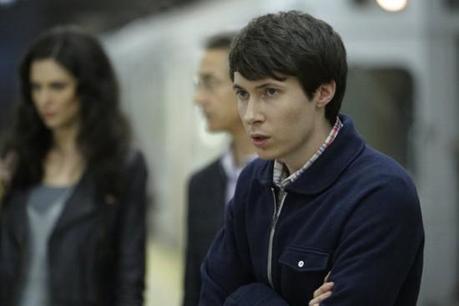Contributor: J.M.
Just as important as the heroes are to any story are the villains. Without a worthy foil to ferment conflict and to challenge the hero or group of heroes, there might as well not be a story. “Alphas” has taken a little bit of time, but has given us a fine villain who is just as compelling a character whose introduction was remarkably well done. In addition to some good character development, “Alphas” looks to have closed out the introductory phase of the season with a bang, and viewers should have every right to be looking forward to the rest of the season with anticipation.

Now that “Alphas” has been on the air for a couple of episodes, one cannot help but compare it to both the “X-Men” and “Heroes”: “X-Men” for the plot of mutant/alpha relations with mundane humans and the tensions on both sides and “Heroes” for their portrayal of the heroes as everymen and women. In my opinion, “Alphas” has already done a better job than “Heroes” at establishing those everyman credentials, especially with Gary and Cam. The women have been slightly underdeveloped, especially Rachel, but Nina has shown potential, largely because of the manipulative nature of her ability. The writers have been a bit more methodical is establishing the “X-Men” comparisons, and I think that it’s worked to the show’s benefit. The focus on the mundane response to these Alphas really set the stage for understanding Red Flag’s organizational motivations.
One potential problem with the X-Men/Mutant Brotherhood type of scenarios is actually what happened in “Heroes”: the continual layering of organizational structure can really hamper the storytelling. But “Alphas” dispenses with that rather quickly, and does so with a little deft twist that helps reveal some minor character development for Cam and Rosen while giving us an in depth look at Gary and the issues that come with being a high-functioning autistic. With Rosen, we see that he can let his emotions about the attempt on his life get ahead of him and causes him to dismiss some of the signs that Cam, with his outsider point of view, is able to catch. To him, learning about the organization is necessary: he doesn’t have the history or the bias towards the organization that Rosen does. That he recognizes this and exhibits a pretty good understanding of the draw of an organization like Red Flag.
But Gary gets the lion’s share of attention and his relationship with Anna. The reveal that she was actually the leader of Red Flag was well done and sold very well by the writers. The complexity of their organization was well executed too, and the fact that Anna, Milos and Goosebumps had a good plan in case that they were rolled up by the government was indicative of this. The writers played on the viewers’ assumptions about how these sorts of organizations are run, expecting that the helpless disabled woman would be the one exploited by the terrorists willing to do whatever the cause was. One of the best scenes of the episode was watching Gary and Anna interact after Anna reveals her role. I certainly wasn’t sure what Gary was going to do: here was someone who he befriended on his own, and who was looking to reinforce some of his negative habits. That he sided with Rosen and the Alpha team was a bit of a relief, as the show has already demonstrated a willingness to mess with viewer expectations.
But clearly this is not the end of the attraction of Red Flag and Anna for Gary. His response to his mother and to Rosen at the end of the episode makes that pretty clear. And if the viewer is honest, they have to understand not only Gary’s reaction to Red Flag but the attraction of the organization as a whole. The choice to introduce Binghampton before revealing a great deal about Red Flag helped drive their appeal home this episode. The choice of Anna as their leader was inspired, especially given their target in the episode: a drug that prevents perceived ‘birth defects’ that may actually result in eliminating Alphas. Having someone like that, who is disabled to the outside world but capable of understanding the intent behind language and communicate with every human being on the planet really makes Red Flag’s causes and methods far more understandable than even Magneto’s in “X-Men”.
This episode was another strong one, closing out the introductory phase of the season now that they have revealed much of the status quo and many of the main characters. Red Flag over the course of a single episode became a worthy opponent and will likely to present a compelling foil to our heroes over the course of the season. The only thing the writers need to do now is round out some of the main characters and they will have themselves a remarkably high quality show.
Rating: 9/10

